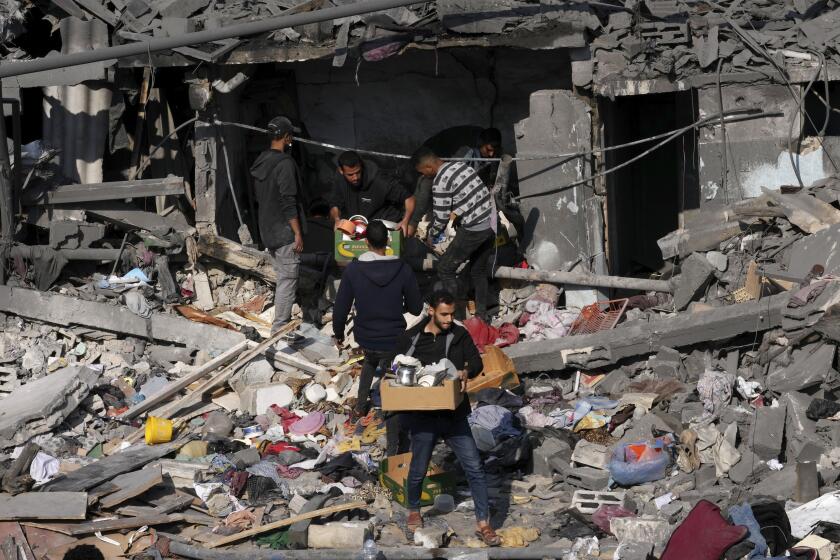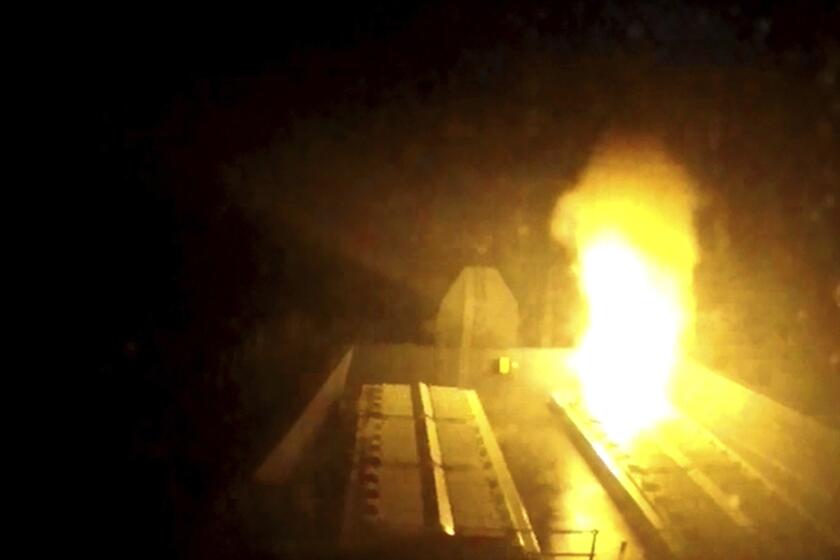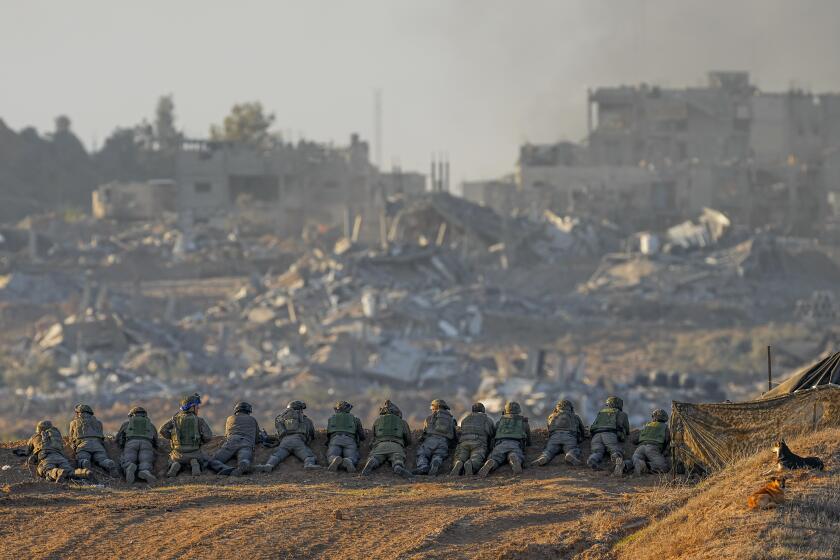Opinion: Biden is sending America’s military back to the Middle East — he shouldn’t

- Share via
It’s not hard to argue these days that President Biden’s Middle East policy is in shambles — and more than 60% of Americans, according to a recent Gallup poll, would agree.
In the aftermath of the brutal Hamas attack on Oct. 7, America’s closest ally in the Middle East, Israel, has engaged in a punishing reprisal on Gaza that by all accounts has been one of the deadliest conflicts for civilians in recent history. American military forces and Iranian-backed proxies are now engaged in near-daily tit-for-tat strikes. Anti-Americanism on the so-called Arab Street is at an all-time high. And Washington’s longtime Arab allies, while eager to see the end of Hamas, are equally incensed by what they see as Biden’s green-lighting of devastation in Gaza, a situation that gives America’s competitors in the Middle East — China and, to a lesser extent, Russia — a new opening to exploit.
U.S. Defense secretary is expected to press Israel to wind down major fighting in Gaza. Human Rights Watch accuses Israel of deliberately starving Gazans.
It’s arguably the biggest challenge to American interests in the region since the convulsions of the 2011 Arab uprisings.
Some observers suggest that the roots of this turmoil lie in Washington’s decade-long effort to “pivot” away from the Middle East and shift American military commitments to Asia. They argue that the power vacuum this created set the stage for the current chaos. Biden himself seems to have bought into this conclusion, using it as the basis for his response to the crisis: throwing more military forces back into the Middle East.
But this diagnosis and the resulting prescription are incorrect, for several reasons.
First, the supposed pivot has actually been quite limited in scope and scale. And second, Biden’s surging of U.S. troops and weapons since the Hamas incursion is hardly what this already militarized region needs. Far from being a stabilizing factor, this response could provoke an escalation to a wider war and entangle America in open-ended commitments, at a time when U.S. military resources are needed in Asia.
The British and U.S. militaries say that a U.S. warship shot down 14 suspected attack drones over the Red Sea and a Royal Navy destroyer downed another one.
Contrary to common assumptions, U.S. military presence across the Middle East increased over the past year, reaching a total of 45,000 troops, backed by aircraft and warships, by early October. U.S. special operations forces have been involved as well, often under the radar, battling the Islamic State and Iranian proxies.
Following the Hamas assault on Israel, Biden bolstered that presence with the addition of two carrier strike groups, an Ohio-class nuclear powered submarine, more air defense systems and fighter aircraft, along with thousands of U.S. military personnel. The stated goal is to reassure allies facing Iranian provocations and to prevent the current conflict from expanding. But the injection of forces is likely to create new risks of escalation instead.
A large, seemingly enduring U.S. military presence gives Tehran justification to double down on its own military buildup and that of its proxies, raising the potential for violence and the costs of miscalculation. Since Oct. 7, attacks by Iranian proxy groups directed at vulnerable U.S. forces in Iraq and Syria have increased in number and severity despite U.S. retaliatory airstrikes, and they have now spilled into the Red Sea with attacks on commercial shipping. It wouldn’t take much for this situation to spin out of control.
This just seems startling: California Democrats think overwhelmingly that America should not take sides in the horrific war in Gaza. But Republicans side strongly with Israel.
Rushing more U.S. military forces into the Middle East also runs the risk of entangling America in the open-ended provision of security to local allies at a time when it should be encouraging them to handle their own defenses. And it marks a return to a timeworn, military-centered U.S. approach to the region, when what is really needed is a more holistic set of policy tools aimed at tackling looming economic and social challenges such as climate change and the transition away from hydrocarbons.
Lastly, Biden’s costly overstretch strains U.S. military resources, leaving Washington unprepared for future crises in the Indo-Pacific, where the United States faces its most formidable competitor in China. Over time, large Middle East deployments will wear down U.S. military assets and personnel and divert investments needed to deter Beijing. Already, compromises are being made: U.S. air defense systems recently deployed to the Middle East will not be available in Asia to defend against China’s missile threat.
After the Holocaust, Germany committed to standing against mass violence. Why are authorities now arresting Jews protesting Israel’s bombardment in Gaza and canceling events with Palestinians?
The risks created by the sustained U.S. military presence in the Middle East can only be addressed by reducing that presence. This can be done responsibly. After sending home recently deployed forces, Washington should further decrease and consolidate its military footprint across a smaller number of U.S. bases in strategic locations, protecting U.S. interests with less exposure. Investing in forward-positioned equipment and logistics capabilities can provide surge capacity for future crises.
Concerns that Iran might be emboldened by such moves are overblown. Facing domestic political and economic pressure, Iran has little to gain from starting a regional war, and has instead pursued diplomatic efforts with neighbors in recent months. And its malign meddling across the region, while certainly a concern, is best countered through intelligence cooperation, maritime and air defense partnerships with allies, and targeted sanctions, rather than a large conventional military presence.
This is a case where less is more. Both the United States and the Middle East will be better off if Washington pulls back its military presence rather than doubling down.
Frederic Wehrey is a senior fellow at the Carnegie Endowment for International Peace in the Middle East Program and Jennifer Kavanagh is a senior fellow in the American Statecraft Program.
More to Read
A cure for the common opinion
Get thought-provoking perspectives with our weekly newsletter.
You may occasionally receive promotional content from the Los Angeles Times.














